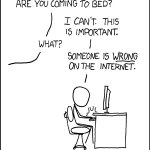
A few years ago, during a summer visit to Israel, we took my then-toddler to the beach. He waded and splashed and, at some point, when the elastic on his swimsuit bothered him, he took it off. A man on the beach took great offense to this and came over in a huff to give me a talking-to about the lack of modesty of my three-year-old. “You have no dignity! There are women here!” Etc. etc. I was quite shaken. My dad was sitting nearby and I told him, “did you hear this guy! What a dirty mind he has if he sees sexuality and indecency in little kids!” etc. etc. My dad chuckled, shrugged his shoulders, and said, “hat er gesagt.” It is a Yiddish expression that means, “so, he said.”
I think about this vignette a lot when I see the enormous graphomaniac outpour on issues of campus speech. Group A put up a flyer! Person B tweeted a thing five months ago! Administrator C censored student organization D for a thing they said! University administrator E said something about faculty member F who said something about group G’s heckling of speaker I! Endless recursive applications of the First Amendment to endless interactions. It seems like we pay so much attention to what this person or that group said that we have no energy left to find out what it is that they even spoke about. Instead of feeling the anguish of war and loss, we drown it in righteous anger over what has been said about war and loss or, worse, what has been said about what was said about war and loss. Perhaps feeling righteous anger is easier than feeling fear and groundlessness. Perhaps being removed from a perilous, terrifying situation urges people to find some connection to the situation, so they tangle themselves in some speech imbroglio. I don’t know.
Here’s what I do know: many opinions about political matters are espoused around me. Some of them I find reasonable. Some of them I disagree with but learn something from. Some of them are stupid or ignorant. Other people’s opinions, if they are not expressed directly to me and ask for my response or are in my field of expertise, are not espoused at me, nor are they necessarily my business unless I choose to make them my business. How much of other people’s opinions I choose to make my business is a function of how knowledgeable I am in that area, whether or not I have energy to spare, and what good I think will come of it. Sometimes, when campus speech veers toward hatred and discrimination that I find acute and dangerous, I say something. Sometimes I let it go because I have bigger fish to fry or because I don’t see the upshot of speaking up. There are short term and long term considerations, all of which are mine to make.
I am not going to singlehandedly improve the quickly eroding standard for civil discourse. Neither are you. We do what we can, where we think it will make a difference, and we dole out our energy wisely.




No comment yet, add your voice below!